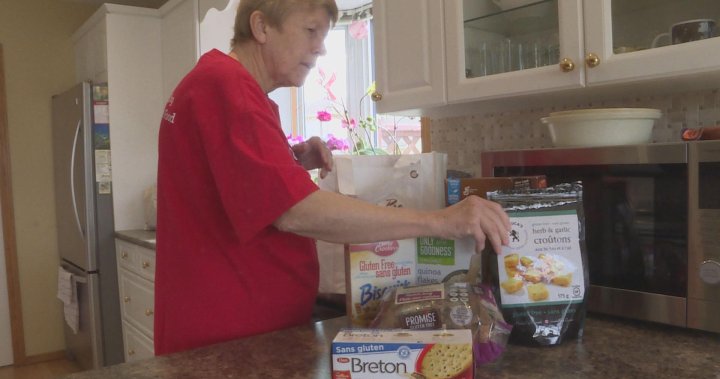Celiac Canada urging Ottawa for better tax relief as gluten-free grocery costs soar | Globalnews.ca
Celiac Canada is urging the federal government to provide better tax relief for people with the autoimmune disease as the cost of gluten-free food soars due to inflation.
On her fixed income, Susan Finlay is sure to make every dollar count at the grocery store.
“This is the pension I have to live on for as long time, so I am very careful about looking. I look for sales. I look for deals,” she said.
Read more:
Canadians making fewer grocery store trips as food inflation continues to bite: report
Finlay, who lives in Winnipeg, was diagnosed with celiac disease more than 20 years ago.
The autoimmune disease affecting about one per cent of Canadians is without a cure or treatment, besides managing it with a lifelong gluten-free diet. Celiac disease damages the small intestine and could lead to serious health complications such as multiple sclerosis, osteoporosis and type 1 diabetes when gluten is ingested.
“People who are diagnosed have difficulty getting food,” Finlay, who also volunteers with the Manitoba branch of the Canadian Celiac Association, told Global News on Sunday.
Finley often finds grocery stores and restaurants nearly sold out of options she can eat.
“And the price is really a big difference.”
Gluten-free products are 150 to 500 per cent more expensive than regular products, Celiac Canada says, and with food inflation, Finlay’s bills have climbed even more.
Celiac Canada’s latest survey points to the rising cost of groceries as the most pressing challenge, the organization’s executive director Melissa Secord said Sunday.
“2.4 per cent of our respondents now access a food bank since the pandemic because of the cost of food, so it is a real driving impact, and unfortunately, they’re maybe choosing to go hungry or they’re going to maybe have to eat something that will make them sick.”
Ahead of celiac awareness month in May, Celiac Canada is asking the federal government for a flat medical tax credit to help offset the impact of food inflation. They’ve written an open letter to MPs and are heading to Parliament Hill on May 1.
Families with the disease spend an average $1,000 more per year than the average Canadian household, Secord told Global News.
Given the current system, most people — about 80 per cent of respondents — don’t claim the extra costs of gluten-free food as medical expenses on their taxes, Secord said.
“How is that fair? It’s not,” she said. “They actually have to look at the difference between the cost of the gluten regular item and the gluten-free item, so it is so onerous.”
Finlay agrees a change would make life much easier.
“Children are just plain going hungry, or they’re eating things that they shouldn’t and making themselves sick, and that’s really sad,” she said. “We know that the ongoing damage shortens life. There’s way more appointments with doctors, usage of the health care system.”
Finlay counts herself lucky that her pension can handle food inflation for now, but she worries for the families who can’t.

© 2023 Global News, a division of Corus Entertainment Inc.
For all the latest health News Click Here




